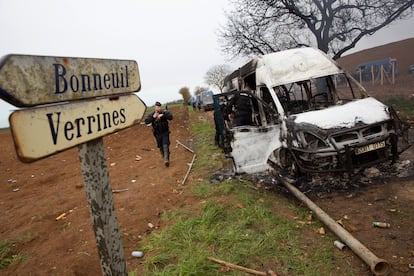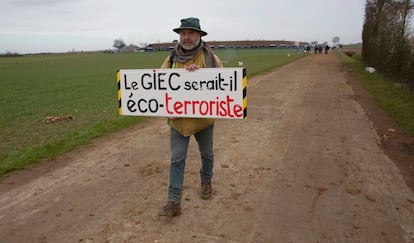Protesters in France: ‘This is not just about retirement, it’s about everything’
A march by a large group of environmentalists in the rural heart of the country ended in a violent confrontation with the police, underscoring the destructive spiral in which popular opposition to Macron has entered


It is 4pm. On the dirt road there is young woman who looks no more than 20 years old lying on the ground, covered with one of those silver foil thermal blankets. She’s got a black eye and a mouth full of blood. She complains quietly in a whisper that nobody understands. Demonstrators are returning from the protest smeared with mud, wearing helmets, gas masks hanging from their necks. Someone tells them to move aside to make way for an ambulance that comes wobbling over the potholes.
Nestled on a green plain in the rural heart of France’s deep west, the village located behind this battle scene is Sainte-Soline, around a four-hour drive southwest from Paris. There are policemen in jeeps patrolling the fields, protesters sitting on the sidewalk looking exhausted, some also bruised. A helicopter is flying overhead, adding a touch somewhere between apocalyptic and incongruous. On the ground, scattered among the crops, there are hundreds of gray tear gas canisters, mounds of clothes thrown away by someone who fled the scene, a broken umbrella, abandoned banners and burning bonfires. There is a burnt smell in the air. In the background, two police vans are still in flames out in the open field.
It all started at 11am. In this spot in the middle of nowhere, an army of security forces faced an army of protesters for over an hour. Environmentalists say they gathered more than 25,000 people to the site. Local officials have lowered the figure to 6,000. The riot officers numbered in excess of 3,000. The reason for the confrontation is an artificial mountain standing several meters high that will house a 10-hectare water reservoir to facilitate irrigation for farmers in the area. Environmentalists maintain that this facility will steal groundwater that is necessary for the area and that what must be done instead is to switch the crops, especially maize. The government, which has alluded to the continuous droughts, is paying for part of the project and defends it.
But there is another underlying reason for the unrest — a deeper, more diffuse one that is pushing many French people to demonstrate more frequently and more violently: weariness and the rage they say they feel against their government and against their president, Emmanuel Macron. This anger is morphing into a thousand different battles that are breaking out and spreading throughout the country. The trigger was the law raising the retirement age from 62 to 64 years. But the tide of discontent over that measure is dragging many more things with it.
According to France Info radio, there are teams of trade unionists in different parts of the country out on a mission to sabotage power plants so they’ll stop supplying certain factories; there are refineries taken over by workers who are threatening to leave French cars out of gasoline. And a new day of national protest has been called for Tuesday, with demonstrations planned in all the main cities that will probably end with more violent episodes. France is steeped in a boiling anger.
One of the young protesters in Sainte-Soline, 25-year-old Renaud, said as he opened the door of another ambulance to let another injured protester in: “Today I am here, but on Tuesday I will be protesting against the increase in the retirement age. In the end, it is the same environmental-social struggle.” A young woman of around the same age who was lying injured on the ground and declined to give out her name said that people had already been demonstrating against the water reservoir as early as October. “But now more have come. And the repression is stronger too.”
Thomas, Besson, 37, dressed in a blue shirt, beige pants and a colored scarf, walks slowly down the path. He is a kind of local philosopher who carries in one hand a book by Noam Chomsky, On Nature and Language. “I agree with the environmentalists,” he says about the recent protest. “But the main problem is that Macron does not listen to the people. He has approved the retirement law by resorting to Article 49.3, which exempts him from putting it to the vote of the Assembly, which means that he was afraid that it would not be approved. And that’s not democratic.”

A local reporter who witnessed the battle was still sounding astonished at what he had seen. “The environmentalists showed up, but in the front lines there were a few thousand radicals dressed in black and itching for a fight. They hurled themselves against the first fence set up by the police, ready to go up the mountain and enter the reservoir. They managed to break down this first barrier, but the police beat them back. Meanwhile, they set two police vans on fire with Molotov cocktails. The battle lasted for more than an hour. The protesters wanted to keep going and had prepared a second wave, but in the end, seeing that there were no ambulances to pick up the wounded, they said they were withdrawing.” The balance is representative: according to the Ministry of the Interior, 24 police officers and seven protesters were injured, including two seriously, one on each side. The protesters have raised the number of injured among their ranks to more than 200, out of which 10 were rushed to hospital and one is in a coma.
The destructive spiral in which the country is caught up keeps growing. On Thursday afternoon, during a demonstration against raising the retirement age, the old wooden door of Bordeaux City Hall was set on fire. The image was seen by the whole world and summed up what is happening in France.

On Friday morning, just as the Sainte-Soline battle was taking place, residents and tourists from Bordeaux gathered at the entrance to City Hall, mesmerized by the sight of the giant door, which is over three meters tall, completely charred but still standing. The mayor, the environmentalist Pierre Hurmic, has placed a proclamation there stating that the town appreciates all the shows of support and will continue to conduct business as usual. In fact, that same Friday a wedding was held and the bride and groom walked through the burned door.
In the nearby town of Cenon, Patrick Youf, 61, owner of a tobacconist shop, endorses the action: “The burned door is symbolic, it alludes to the misery growing on the street. That’s why everything turns into anger.” Youf will retire in July (the new law will hardly affect him), he will sell his house and move somewhere near Valencia, in eastern Spain. He was a member of the Yellow Vest movement years ago, which put President Macron in check during 2018 through protests very similar to those being organized now. “Back then it was not just about the price of diesel, and now it is not just about the retirement age,” he clarifies. “It’s about everything: the drop in purchasing power, the rise in prices, the rise in energy, the degradation of public services…”. And he adds: “Schools have more problems and fewer teachers, and the waiting list keeps getting longer for appointments with medical specialists. No, it’s not a protest about the retirement age, it’s about everything: it is a global protest, it is against Macron, who is bringing ruin to France.”
Sign up for our weekly newsletter to get more English-language news coverage from EL PAÍS USA Edition
Tu suscripción se está usando en otro dispositivo
¿Quieres añadir otro usuario a tu suscripción?
Si continúas leyendo en este dispositivo, no se podrá leer en el otro.
FlechaTu suscripción se está usando en otro dispositivo y solo puedes acceder a EL PAÍS desde un dispositivo a la vez.
Si quieres compartir tu cuenta, cambia tu suscripción a la modalidad Premium, así podrás añadir otro usuario. Cada uno accederá con su propia cuenta de email, lo que os permitirá personalizar vuestra experiencia en EL PAÍS.
¿Tienes una suscripción de empresa? Accede aquí para contratar más cuentas.
En el caso de no saber quién está usando tu cuenta, te recomendamos cambiar tu contraseña aquí.
Si decides continuar compartiendo tu cuenta, este mensaje se mostrará en tu dispositivo y en el de la otra persona que está usando tu cuenta de forma indefinida, afectando a tu experiencia de lectura. Puedes consultar aquí los términos y condiciones de la suscripción digital.








































